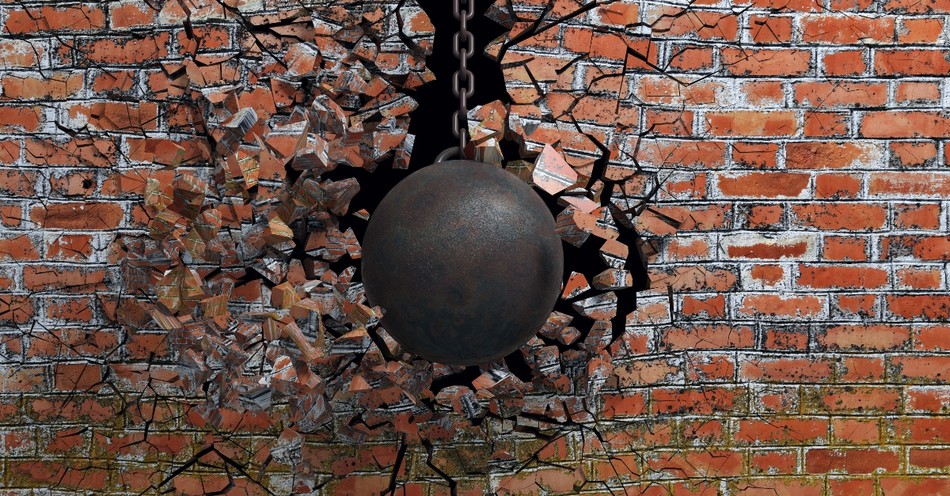The concept of "deconstruction" may be frightening, trendy, or just a mystery, depending on who you are. This article will cover aspects of deconstruction in the realm of the Christian faith.
Deconstruction is beginning to be viewed, in evangelical and fundamental Christian circles, as an attack on Christianity.
This issue affects people, especially in progressive or non-institutional Christian circles, where faith deconstruction is seen as a measure for judging a person's true Christian commitments, as well as circles where the Word, despite its common usage and popularity, doesn't even receive a mention and only receives blank stares when asked about.
The real question is, what is it exactly, and why are people so divided on the matter of deconstruction?
The term "deconstruction" is widely used in Christianity today, despite its unpleasant connotations. Christian truths have been deconstructed in recent years using the words analysis, comparison, and, ultimately, rejection.
For example, it has been used as a way to tell stories by disassembling ideas and believing that their meaning is inherently subjective. Therefore, we should try to understand how some Christians use this very daunting term.
Should Faith Be Deconstructed?
First, let us understand those who view deconstruction as important to faith. Some believe that it is inevitable, and faith must be deconstructed. Others claim it is crucial for a variety of reasons.
In this view, some argue that the concept of breaking paradigms down in order to rebuild better ones has actually been around for as long as humanity has.
In fact, they argue that it's something we do by nature from the time we are born, and it's so complex that an entire universe of developmental psychology is dedicated to the study of it.
During our childhood, we develop simplified ways of understanding the world that is, in order to take in information and categorize it, then describe it in a logical manner. We have to deconstruct those simple paradigms as we get older and come across more complex situations.
As you can imagine, each of these perspectives on the world has a variety of influences and comes in a variety of forms. Consequently, there is no set number of times a person can or will adopt a new perspective on the world.
The paradigms that appear to be common in all cultures and locations are certainly not universal, and some may simply be culturally specific. A person might, for one reason or another, want to stop for whatever reason at a certain stage and never move beyond it.
That is why, for some who view deconstruction as essential to faith, it is believed that Christians need deconstruction to grow and develop. Moreover, deconstruction is the process of making room for new information and understanding it by a process.
In our youth as Christians, we do not have a lot of experience and knowledge, which is why we need simple paradigms to explain and understand the world around us.
In the course of our Christian lives, we encounter information that is totally outside of our paradigm, or perhaps even contradicts it, as we experience and learn more.
As a result, we must rethink everything we previously believed and find ways to make it all come together in the context of what we know.
Deconstruction and Backlash
On the other hand, some argue that deconstruction is a backlash. Some religious circles ignore hard questions of Christianity in the name of conservatism. According to them, deconstruction represents a backlash against this unfortunate tendency.
The biblical principle of being open to changing our minds about the subtleties of faith is a valuable one, but some uncomfortable ideas seem to be replaced with ones that are more culturally or personally acceptable through deconstruction.
The Bible says that we are prone to being stubborn and misinterpreting God's will. There are many opinions on every topic, but each should be open to serious inquiry. The Bible requires that one's faith be examined.
It is essential for us to prepare thoughtfully, be skeptical, cooperate with others, learn from others, and love what He has made for us.
The biblical mandate for Christians is to reflect on what they believe and why they believe it and evaluate it for the truth. Deconstruction fails to do this.
While deconstruction explores these topics, its ultimate purpose is usually to undermine rather than to understand.
Whenever we feel like we know everything, we naturally want to stay in control. As opposed to allowing doubts and questions, some Christian communities reject anything that goes beyond superficial curiosity.
There is also a risk of unjustly labeling those with doubts as troublemakers. Some religions focus on preserving teachings that are second-hand or superficial. Culture or politics may lead them to adopt a distorted view of Christianity.
Deconstruction Is Choosing Easier Beliefs
Another view of deconstruction is that it is choosing simpler beliefs. It often means avoiding all topics that do not fit into the popular culture, such as sexuality, gender, salvation, sin, hell, etc. Deconstructionists, in this view, generally follow the flow of their culture rather than going against it.
Inconvenient questions need to be asked in a confidential area. Deconstruction, however, often opts for simple, straightforward solutions. It may also choose to keep or discard certain parts of its faith based on personal preferences.
On the other hand, they argue that deconstruction is most often seen as an excuse for justifying radical views. Contrary to what one might imagine, those who criticize Christian culture for not addressing questions may themselves be evasive when asked to speak on the issue.
It is not hard to ask difficult questions. A complex mystery can be explained in just a few words. More complicated questions require more time. Deconstruction is a tactic to avoid taking a position and merely rejecting what one dislikes.
People tend to assume they are being superior when they point out the flaws in another's view. When one forgets that questions go both ways, questions can come across as an attack.
Deconstructionists complain often that they are denied a safe space to discuss their ideas. But it is also true that some Christian communities unreasonably close their doors to doubters.
Deconstruction and Suffering
Another view of deconstruction is related to how people react to certain phenomena. In this view, they argue that people deconstruct when they suffer deeply.
Some individuals who have experienced abuse, neglect, or rejection by a church context find it difficult to understand the teaching of Scripture in the context of such events. When their leaders fail and betray them, Christians are hurt and embarrassed.
Our loved ones also feel our pain. In response to such struggles, they partly discard doctrines and beliefs to distance themselves from stigmas attached to others' actions. Therefore, addressing the shortcomings of the modern Church is possible and essential.
In spite of this, deconstruction represents long-established, innate principles. There will always be those who are superficially connected to faith. In fact, the fragility of understanding was mentioned many times in the Bible.
For example, the Book of Hebrews describes those whose understanding is fragile enough to crumble under pressure. In the same way, the parable of Jesus shows two groups of people who are willing to follow the truth, only to be overpowered by worldly pressures.
And we can read it in the years of Paul's life when he saw his friends giving in to popular trends. In fact, Christ himself saw people walking away, rejecting His message. The fact is that even though lies are appealing to people, they are often believed.
The Church Has to Remain Firm and a Safe Environment
Whether which view of deconstruction a person may be, the Church must remain firm in the Word of Truth. Faithful people should hold fast to fundamental principles while respecting skeptics.
Sometimes, Christians insist on pursuing the truth regardless of what the rest of the world thinks. It is recorded in the Book of Acts that the early church made reasonable concessions to Jewish believers.
Church officials refused to compromise their cornerstone teachings, despite intense pressure. In spite of accepting the need to consider culture when communicating, early Christians refused to accept false teaching due to its popularity.
What Does This Mean?
Christians should respond to questions from seekers and skeptics with love. Rather than hiding the fact that you don't know, simply admit it, and propose getting an answer together. Defending your faith does not have to be an adversarial process.
Alternatively, curiosity can be a barrier. Even skepticism can be difficult to handle. For many people, their past is painful and complicated. Believers should provide a safe environment where people can speak out about their concerns and doubts.
The fact that someone has fallen away despite loving treatment doesn't necessarily indicate a lack of truth in the Christian faith. We should not let attitudes of deconstruction replace sincere inquiry. And most of all, we should ask for divine intercession from Christ when these inquiries happen.
For further reading:
How Should Christians Respond to the Deconstruction of Faith?
The Problem with Deconstructing Faith
Can a Christian Doubt God and Still Have Faith?
Photo Credit: ©iStock/Getty Images Plus/george tsartsianidis
Glory Dy has been a content creator for more than 10 years. She lives in a quiet suburb with her family and four cats.




